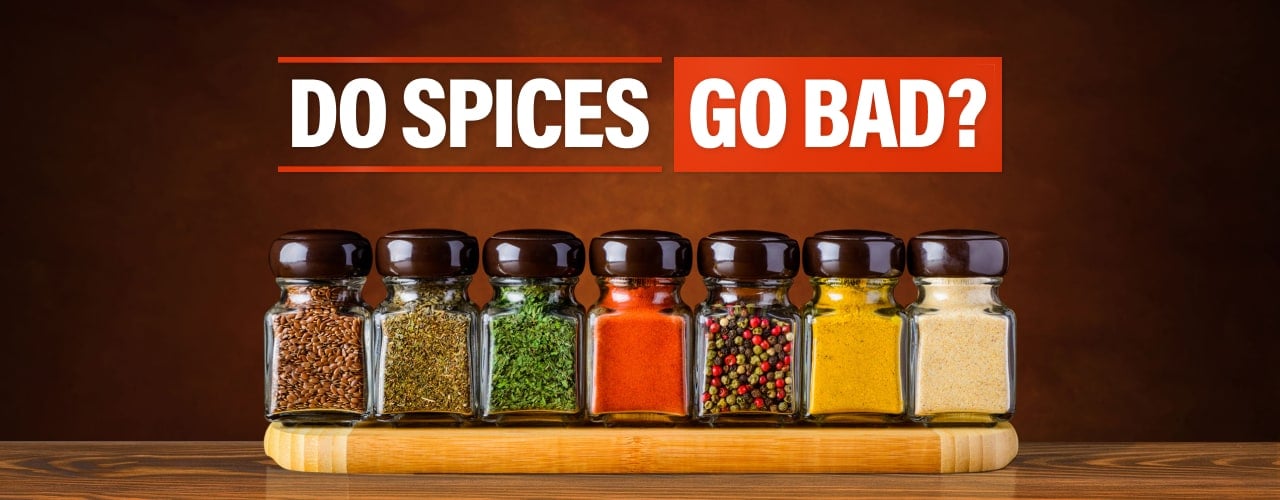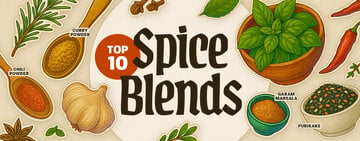By using pre-mixed spice blends, chefs can save time and effort in measuring and combining individual herbs and spices, ensuring consistency in flavor profiles across dishes. These blends simplify inventory management and storage, as they require less shelf space compared to individual spices, and they help reduce overall food costs by eliminating multiple spice purchases. We've rounded up the top ten most universal spice blends you should stock in your commercial kitchen for your most foundational cooking needs. Shop All Spice Blends Learn about the most popular spice blends: 1. Furikake 2. Garam Masala 3. Adobo 4. Italian Seasoning 5. Everything Bagel Seasoning 6. Za’atar 7. Curry Powder 8. Chili Powder 9. Herbs de Provence 10. Chinese Five Spice 1. Furikake Furikake (pronounced foo-ree-KAA-kay) is a Japanese seasoning blend that adds a burst of umami flavor to dishes. This savory mixture typically consists of dried seaweed (nori), toasted sesame seeds, bonito flakes, salt, and sugar. Some variations may also include dried fish, shrimp, or egg for added depth of flavor. From poke bowls and sushi varieties to salads and grilled meats, furikake is a must-have ingredient for any chef looking to innovate in the kitchen. The flavor profile of furikake is a delightful combination of salty, sweet, and savory notes, making it a perfect seasoning to sprinkle over rice, noodles, vegetables, or even popcorn. Its umami-rich taste can elevate simple dishes and turn them into gourmet delights with just a sprinkle. Furikake Ingredients: Dried seaweed, toasted sesame seeds, bonito flakes, salt, and sugar; some renditions include miso powder, chili flakes, dried seafood, or dried egg Furikake Tasting Notes: Umami, salty, seafood, slightly sweet Furikake Applications: Rice, poke bowls, grilled meats, salmon, popcorn, Asian noodle dishes Furikake Substitutes: Shichimi togarashi, salt + sesame seeds 2. Garam Marsala Originating from India, garam masala is a staple in many traditional Indian dishes. It typically includes a mix of warming spices such as cinnamon, cloves, cardamom, cumin, coriander, and black pepper. The combination of these spices creates a complex and robust flavor profile that is both spicy and slightly sweet. Its rich and fragrant aroma will tantalize your taste buds and transport you to the vibrant streets of Mumbai with every bite. One of the key benefits of investing in garam masala is its versatility. Whether you're preparing different types of curry, marinating meats, or seasoning vegetables, this spice blend can elevate the taste of any dish. It can also be used in baked goods for a unique twist. Experiment with this versatile blend in both savory and sweet dishes to discover new and exciting flavor combinations that will impress your customers and elevate your culinary creations. Garam Marsala Ingredients: Cinnamon, cardamom, cloves, cumin, coriander, nutmeg, black pepper; some will include bay leaves, star anise, fennel seeds, and red chilies Garam Marsala Tasting Notes: Warming, earthy, slightly sweet, subtle heat, floral essences Garam Marsala Applications: Rice, noodles, poke bowls, grilled meats, salmon, popcorn, baked goods Garam Marsala Substitutes: Curry powder, cumin + allspice 3. Adobo Adobo is a versatile spice blend typically consisting of garlic, oregano, black pepper, and turmeric or paprika. Some variations may also include ingredients like cumin, onion powder, and bay leaves. The combination of these spices creates a savory and slightly tangy flavor profile that can enhance a wide range of dishes. If you find yourself without adobo in your spice rack, you can easily create a substitute by combining equal parts garlic powder, onion powder, oregano, and black pepper. This DIY version will help you achieve a similar flavor profile. Originating in the Philippines and later adopted by Spanish and Latin American cuisines, adobo has become a global favorite for its ability to add depth and richness to meats, poultry, seafood, and vegetables. It is often used as a rub for meats before grilling, roasting, or braising. In commercial kitchens, adobo is a go-to spice blend for seasoning meats for tacos, burritos, and fajitas. It can also be used to flavor rice, beans, soups, and stews, adding complexity to the dish. Its versatility makes it a popular choice for restaurants looking to add a touch of Latin flair to their menu offerings. Adobo Ingredients: Garlic, oregano, black pepper, and turmeric or paprika; some may include cumin, onion powder, and bay leaves Adobo Tasting Notes: Tangy, salty, savory Adobo Applications: Latin American cuisine, meat rubs, rice, beans, stews Adobo Substitutes: Smoked paprika, chipotle peppers in Adobo sauce, chipotle powder, simple homemade blend of equal parts garlic powder + onion powder + black pepper, oregano, chili powder, and cumin 4. Italian Seasoning Italian seasoning is a staple in Italian cuisine and has gained worldwide popularity for its aromatic and savory flavor. It contains a mix of dried herbs, such as basil, oregano, rosemary, thyme, and marjoram, as well as garlic powder. Each ingredient contributes to its earthy, herbaceous flavor profile, creating a well-balanced seasoning. Italian seasoning enhances pasta sauces, marinades, dressings, soups, stews, roasted vegetables, and meats. Whether you are making a classic spaghetti Bolognese, a hearty minestrone, or a flavorful herb-roasted chicken, Italian seasoning elevates the taste of your culinary creations. If you find yourself without Italian seasoning, you can create a similar flavor profile by combining equal parts of dried basil, oregano, thyme, and rosemary. This homemade blend can serve as a suitable substitute and add an Adriatic flair to your dishes. Alternatively, adding a pinch of dried basil to Herbs de Provence serves as a suitable substitute. Italian Seasoning Ingredients: Basil, oregano, rosemary, thyme, marjoram, and garlic powder Italian Seasoning Tasting Notes: Herbaceous, earthy Italian Seasoning Applications: Pasta sauces, dressings, marinades, stews, meats, roasted vegetables Italian Seasoning Substitutes: Herbs de Provence + pinch of dried basil, blend of equal parts dried basil, oregano, thyme, and rosemary 5. Everything Bagel Seasoning Originally inspired by the toppings found on an everything bagel, this spice blend has broadened its horizons. It's composed of sesame seeds, poppy seeds, dried garlic, dried onion, and salt, creating a savory and aromatic mixture that adds depth to culinary creations. The flavor profile of everything bagel seasoning is a harmonious blend of nuttiness from the sesame seeds, a slight crunch from the poppy seeds, and a savory punch from the garlic and onion. The addition of salt helps to balance the flavors and elevate the overall taste of the seasoning. It's believed that everything bagel seasoning originated in New York City, where everything bagels are a beloved staple in the local food scene. It is commonly used as a topping for bagels, bread, and pastries, adding a flavorful crunch and visual appeal. Everything bagel seasoning can also be sprinkled on salads, roasted vegetables, eggs, avocado toast, and even incorporated into dips and spreads for an extra burst of flavor. Don't have it on hand? A simple DIY version can be made by combining equal parts sesame seeds, poppy seeds, dried garlic, dried onion, and salt. Other alternatives include using a combination of sesame seeds, garlic powder, onion powder, and salt to achieve a similar flavor profile. Everything Bagel Seasoning Ingredients: Sesame seeds, poppy seeds, dried garlic, dried onion, and salt Everything Bagel Seasoning Tasting Notes: Nutty, salty, garlicky, oniony Everything Bagel Seasoning Applications: Bagels, avocado toast, eggs, roasted vegetables, salads Everything Bagel Seasoning Substitutes: Blend of 1 part poppy seeds, 2 parts white sesame seeds, 1 part black sesame seeds, 1.5 parts dried minced garlic, 1.5 parts dried minced onion, and 0.5 parts salt 6. Za’atar Za’atar (pronounced zaa-tuh) is a versatile and aromatic spice blend that has been a staple in Middle Eastern and Mediterranean cuisines for centuries. It combines dried thyme, oregano, marjoram, sesame seeds, salt, and sumac. The exact proportions of these ingredients vary depending on the region and personal preferences. Some blends will include cumin and coriander, but the overall flavor profile remains consistent. Originating in the Middle East, za’atar is widely used in countries like Lebanon, Syria, Jordan, and Israel. It is known for its earthy, tangy, and slightly nutty flavor profile, with hints of citrus from the sumac. The sesame seeds add a subtle crunch to the blend, enhancing its texture and overall appeal. Za’atar is a must-have spice blend for any commercial kitchen looking to add a touch of Middle Eastern flair to their dishes. It is commonly sprinkled over flatbreads, such as pita or mana’eesh, before baking to add a burst of flavor. It can also be mixed with extra virgin olive oil to create a flavorful dip for bread or vegetables, or used as a seasoning for grilled meats, roasted vegetables, or salads. If you don't have za’atar in your pantry, you can add sesame seeds and lemon zest to Italian seasoning or Herbs de Provenance to add the nutty, tangy notes of za'atar to these earthy, herbaceous blends. Za’atar Ingredients: Sesame seeds, poppy seeds, dried garlic, dried onion, and salt Za’atar Tasting Notes: Tangy, nutty, earthy Za’atar Applications: Middle Eastern cuisine, dips, pita, mana'eesh, grilled meats, roasted vegetables, salads Za’atar Substitutes: Add sesame seeds and lemon zest to Italian seasoning or Herbs de Provenance 7. Curry Powder Curry powder offers a unique flavor profile that is warm, aromatic, and slightly spicy. While its composition varies based on regional preferences and individual recipes, common curry powder ingredients include turmeric, coriander, cumin, ginger, fenugreek, and chili peppers. Additional spices such as cardamom, cinnamon, mustard seeds, and garlic may also be included, contributing to its complex flavor profile. The combination of spices in curry powder provides a balance of earthy, savory, and slightly sweet notes, with a hint of heat from the chili peppers. The turmeric in curry powder gives it a natural, vibrant yellow color and adds a subtle bitterness. Although curry powder is often associated with Indian cuisine, it is a Western invention developed to mimic the flavors of Indian dishes. The British colonialists in India created this spice blend by combining a mix of Indian spices to replicate the taste of traditional Indian curries. Curry powder's warm, aromatic, and slightly spicy flavor profile is used in a variety of global cuisines, including curries, stews, soups, marinades, and rubs. It pairs well with meats, poultry, seafood, vegetables, and legumes. It can also be used as a seasoning for rice or mixed into mayonnaise or yogurt for a flavorful dip or dressing. If curry powder is unavailable, garam masala, a traditional Indian spice blend, can be used as a substitute, but it will have a slightly different taste profile. Alternatively, a mixture of individual spices such as turmeric, cumin, coriander, and chili powder can be combined to create a custom curry powder blend. Curry Powder Ingredients: Turmeric, coriander, cumin, ginger, fenugreek, and chili peppers are staples; some will include cardamom, cinnamon, mustard seeds, and garlic Curry Powder Tasting Notes: Warm, earthy, spicy Curry Powder Applications: Curries, stews, soups, marinades, meat rubs, legumes, dressings Curry Powder Substitutes: Garam masala, or a mixture of individual curry powder ingredients 8. Chili Powder Made from a mix of dried, ground chili peppers, along with other complementary spices, chili powder is a staple in many commercial kitchens. While the exact blend of spices varies depending on the brand, chili powder typically consists of ground chili pepper varieties, such as cayenne or ancho, along with spices like cumin, garlic powder, and oregano. It has a rich and robust flavor with a moderate level of heat, offering a balance of smokiness, sweetness, and spiciness. Chili powder has its roots in Mexican cuisine, where it is commonly used in dishes like chili con carne and enchiladas. However, it has since become popular in various international cuisines, including Tex-Mex and Indian. It's a great addition to chili, stews, soups, and marinades, adding depth and complexity to the overall flavor profile. It can also be used to season meats, vegetables, and even as a popcorn seasoning. If you run out of chili powder, you can substitute it with a mix of paprika, cayenne pepper, cumin, and garlic powder to achieve a similar flavor profile. Adjust the amounts of each ingredient to match your desired heat level. Chili Powder Ingredients: Ground chili peppers, cumin, garlic powder, and oregano Chili Powder Tasting Notes: Spicy, herbal, rustic Chili Powder Applications: Tex-Mex cuisine, chili con carne, enchiladas, chili, stews, soups, marinades, seasoning for meats, vegetables, and popcorn Chili Powder Substitutes: Mix of paprika, cayenne pepper, cumin, and garlic powder 9. Herbs de Provence Originating from the Provence region in southeastern France, this blend captures the essence of the Mediterranean with its vibrant and herbaceous flavors. It typically includes a combination of dried herbs such as thyme, rosemary, marjoram, savory, and oregano, along with floral notes from lavender and other fragrant herbs. The distinct flavor profile of Herbs de Provence is earthy, floral, and slightly sweet, making it a versatile seasoning for a wide range of dishes. Herbs de Provence is commonly used to season poultry, seafood, vegetables, and soups, adding a depth of flavor to dishes. It pairs well with olive oil and garlic, enhancing the taste of roasted or grilled meats and vegetables. This versatile blend can also be used to season sauces, dressings, and marinades, infusing them with a savory and aromatic profile. If you don't have Herbs de Provence, a simple blend of equal parts dried thyme and rosemary can work as a substitute, although it will lack the full complexity of the original. Italian seasoning is also an acceptable substitute, but it will add basil, garlic, and red pepper flakes to your dish. Herbs de Provence Ingredients: Thyme, rosemary, savory, marjoram, and oregano, with many blends also including lavender, fennel, and chervil Herbs de Provence Tasting Notes: Fragrant, herbal, floral, peppery Herbs de Provence Applications: Roast meats, vegetables, stews, soups, tomato-based sauces, marinades, vinaigrettes, rub for grilling Herbs de Provence Substitutes: Equal parts dried thyme and rosemary, Italian seasoning 10. Chinese Five Spice Chinese Five Spice is typically made up of five key ingredients that give it its distinctive flavor: star anise, cloves, Chinese cinnamon (cassia), Sichuan peppercorns, and fennel seeds. The flavor profile of Chinese Five Spice is a harmonious blend of sweet and savory notes with a hint of warmth and spice. The star anise provides a sweet licorice-like flavor, while the cloves add a warming element. The Chinese cinnamon adds a sweet and spicy element, and the Sichuan peppercorns contribute a numbing and citrusy flavor. Fennel seeds bring a subtle sweetness and a hint of anise to the mix. Chinese Five Spice has its origins in traditional Chinese cooking and has been used for centuries to enhance the flavor of Asian dishes. The blend represents the five elements of Chinese philosophy (sweet, sour, bitter, salty, and umami), creating a well-balanced and flavorful seasoning. It is commonly used to season meats such as pork, duck, and chicken, as well as noodle stir-fries, soups, and marinades. It can also be added to sauces, rice dishes, and vegetable stir-fries. You can create a similar flavor profile to Chinese Five Spice by combining equal parts ground star anise, cloves, Chinese cinnamon, Sichuan peppercorns, and fennel seeds. In a pinch, you can use garam masala or allspice as substitutes. Chinese Five Spice Ingredients: Star anise, cloves, cassia, Sichuan peppercorns, and fennel seeds Chinese Five Spice Tasting Notes: Warm, aromatic, spicy, slightly sweet Chinese Five Spice Applications: Pork, duck, chicken, stir-fries, soups, marinades, rice dishes Chinese Five Spice Substitutes: Garam masala, allspice, equal parts ground star anise + cloves + Chinese cinnamon + Sichuan peppercorns + fennel seeds Back to Top Spice Blend Brands When purchasing spice blends for your commercial kitchen, choosing reputable brands ensures quality and consistency. Here are some top spice blend brands that you can consider investing in: Regal Spice Regal Spice is known for its dedication to customer satisfaction and commitment to providing high-quality products at affordable prices. With a wide range of ground spices, toppings, and soup bases, Regal Spice helps commercial kitchens elevate their dishes with flavorful ingredients that meet their culinary needs. Whether you are looking to season a signature dish or enhance the taste of a classic recipe, Regal Spice is a trusted choice for chefs and foodservice professionals seeking reliable and versatile spice blends. Average Price Point: $0.31 per ounce Flavors: Curry powder, taco seasoning, Cajun, fajita seasoning, jerk seasoning, buffalo wing seasoning, crab mix, Mediterranean herb, adobo, everything bagel seasoning, chili powder, lemon pepper, Italian seasoning, blackened seasoning, garam masala, Herbs de Provence, five spice See what our customers are saying about Regal Spice here! McCormick Culinary Founded to provide customers with the highest quality spices and flavor solutions, McCormick Culinary is a subsidiary of its parent company, McCormick, which was established in 1889. With a long history in the industry, McCormick has solidified its position as a premier name in the foodservice sector. Committed to the art, science, and passion for flavor, McCormick Culinary offers a wide range of spice blends that cater to the diverse needs of commercial kitchens. Average Price Point: $0.70 Flavors: Everything bagel seasoning, za'atar, five spice, Herbs de Provence, Italian seasoning, harissa, Cajun, jerk seasoning, mesquite BBQ seasoning, lemon pepper, taco seasoning, fajita seasoning See what our customers are saying about McCormick Culinary here! Back to Top Finding the right spice blend can take your dishes to the next level. Whether you're looking to add a kick of heat, a hint of sweetness, or an aromatic essence, there's a spice blend out there for you. Once you're stocked with these basics, explore other unique spices to impress your customers with bold and delicious flavors.







